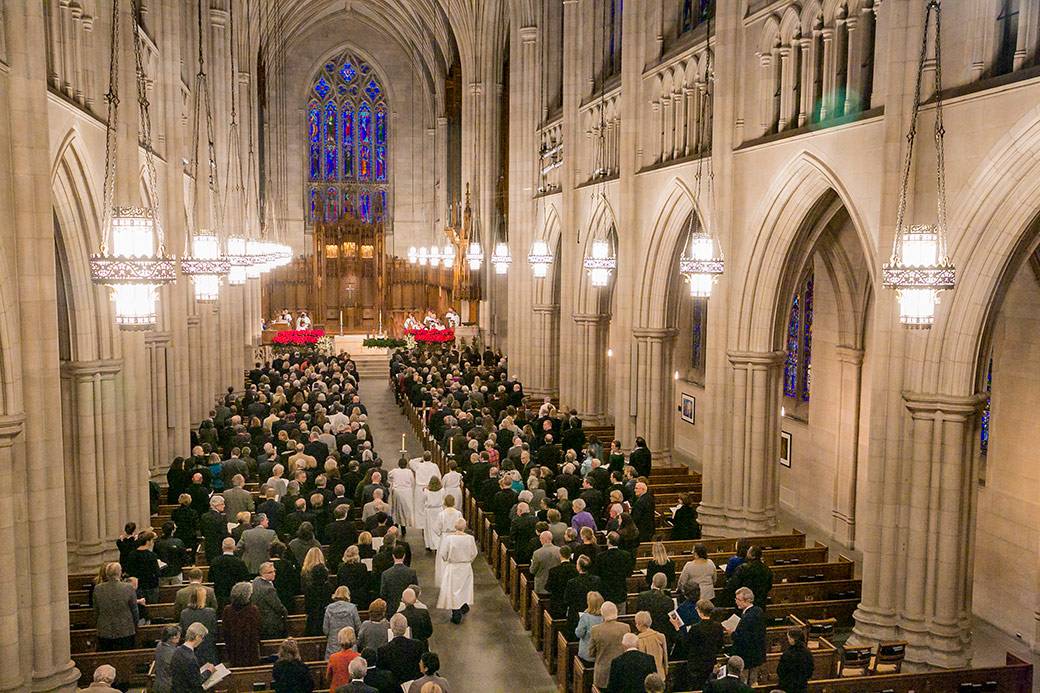President Brodie Remembered as One Who Left Duke, Durham a Better Place

More than a thousand people filled Duke Chapel Monday to hear how former university president Dr. H. Keith H. Brodie, who died Thursday night, made the university a better place during his more than 40 years at Duke.
In delivering the eulogy, President Richard H. Brodhead noted the highlights of Brodie’s biography at Duke: His path-breaking psychiatric work on the neurobiology of eating and other disorders; his role as chancellor where he built connections between the hospital and campus sides; his eight years as president where he helped put in place important pieces that raised Duke from a strong regional institution to one with a national reputation.
These biographical notes were already well-known, Brodhead said. Under Brodie’s leadership, Duke doubled the percentage of undergraduate students receiving financial aid, from 20 to 40 percent, and implemented minority recruiting policies that changed Duke as a place that was “desegregated in principle to one that was desegregated for real.”
“It was a common saying how Terry Sanford tore down the walls that held Duke back and then Keith propelled the university into new spaces.”
But talking just about Brodie’s presidency would fail to explain the impact he made on Duke and the faculty, staff and students he affected here and in the community, Brodhead said.
He cited Brodie’s love of teaching and noted how even as president he continued teaching undergraduates a brain science class that Brodhead said changed several students' lives. His role on campus as an adviser, both formal and informal, went beyond students, though, and included faculty, staff and alumni.
After Brodhead arrived at Duke in 2004, he himself had been the recipient of such advice. He noted one discussion in particular.
“During the conversation, he suggested that every day I do something good for someone that nobody knows about,” said Brodhead. “I think that is as good advice as I’ve ever received.”
“We assume Duke has always been great,” Brodhead continued, “but it had to be made. The role that Keith played is making Duke as we know it something we can celebrate today.”
The chapel was dressed in green for the advent season. The music included some of Brodie’s favorite hymns, from Ralph Vaughn Williams to Beethoven.
The large turnout was representative of the diverse ways Brodie made a difference. There were former students who took his famous brain science class; faculty members hired under the Black Faculty Initiative, the university’s first plan to increase the number of minority faculty members; and alumni and community members who worked with Brodie and his wife Brenda on their numerous volunteer efforts in Durham.
One of the readings in the service was from Paul’s letter to the Colossians, in which the apostle commanded followers to clothe themselves in “compassion, kindness, humility, gentleness and patience.” In delivering the homily, the Rev. Will Willimon said the reading suited the occasion.
“I know a man whose life demonstrated that kindness, humility and compassion, these are not unreachable ideals, but they’re the way God means life to be lived,” said Willimon, a Divinity School professor who served as dean of Duke Chapel under Brodie. “We are all here because we all know that man, too: Keith Brodie.”
Memorials may be made through contributions to SEEDS, the urban gardening and educational program supported by the Brodies, or the Congregation at Duke Chapel.